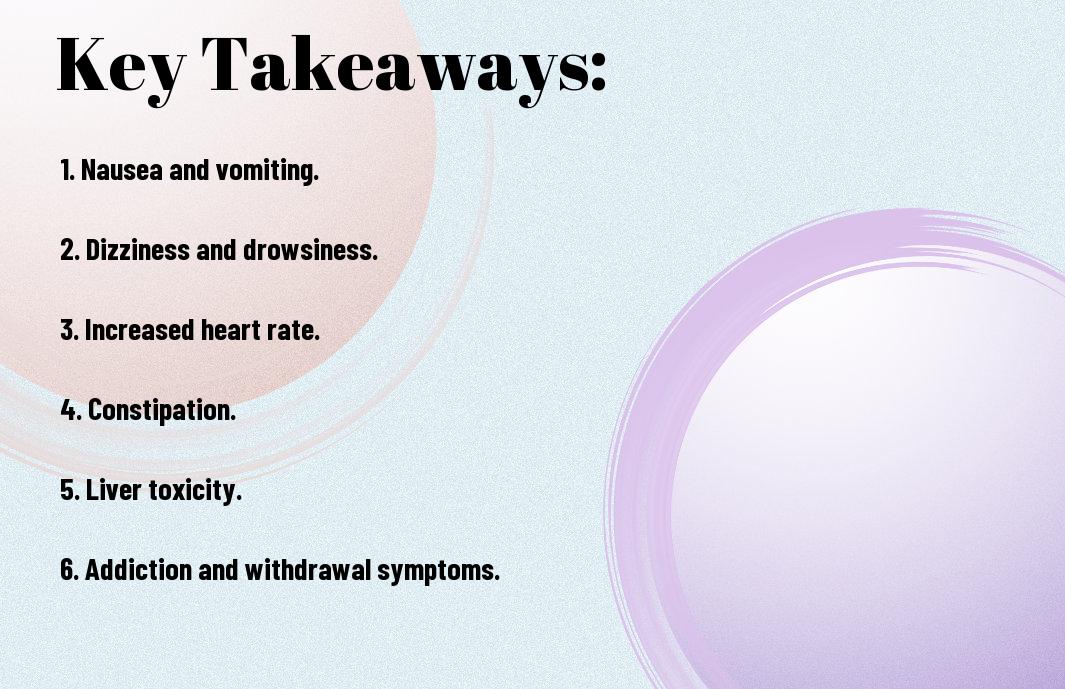With the rising popularity of kratom, it is crucial to understand the potential side effects this natural herb may bring. While some users report positive effects like pain relief and mood enhancement, there are risks associated with its consumption. From nausea and dizziness to more severe issues like liver damage and addiction, being aware of the potential side effects of kratom is necessary for those considering using this substance.
Key Takeaways:
- Common side effects: Kratom can lead to side effects such as nausea, dizziness, constipation, and sedation.
- Dependency and addiction: Prolonged use of kratom may result in dependency and addiction, leading to withdrawal symptoms when trying to quit.
- Health risks: Using kratom may also pose risks to liver health and could potentially interact with other medications, emphasizing the importance of consulting a healthcare provider before using it.

Common Side Effects
The Drug Fact Sheet: Kratom lists several common side effects associated with kratom use. These side effects can vary in severity depending on the dosage and individual tolerance levels.
Mild Side Effects
Effects such as increased urination, constipation, nausea, and dry mouth are some of the mild side effects that individuals may experience when using kratom. While these effects may be bothersome, they are generally temporary and tend to subside as the body adjusts to the substance. It is important for users to monitor their consumption and consult with a healthcare professional if these mild side effects persist or worsen.
Moderate Side Effects
Mild side effects may progress to more moderate symptoms such as dizziness, drowsiness, and confusion. It is crucial for individuals to be aware of these effects and exercise caution when using kratom, especially when engaging in activities that require focus and coordination. Understanding the potential for moderate side effects can help users make informed decisions about their kratom consumption and prioritize safety. Consulting with a healthcare provider before using kratom can also help individuals mitigate the risk of experiencing moderate side effects.

Physical Side Effects
Nausea and Vomiting
Any substance that affects the gastrointestinal system can potentially lead to nausea and vomiting. These are among the most common side effects reported by individuals who use kratom. The intensity of these symptoms can vary depending on the individual’s sensitivity to the herb and the dosage consumed.
Dizziness and Lightheadedness
Any substance that alters brain chemistry can cause dizziness and lightheadedness. These side effects are also frequently reported by kratom users. These sensations can be mild or severe, and may be accompanied by feelings of imbalance or disorientation.
To elaborate further on the side effects of dizziness and lightheadedness, it’s important to note that these symptoms can be especially problematic when driving or operating heavy machinery. Individuals using kratom should exercise caution and avoid potentially dangerous activities if they experience these effects.
Headaches and Fatigue
Fatigue and headaches are two more common physical side effects reported by individuals using kratom. Fatigue may present as a feeling of extreme tiredness or lethargy, while headaches can range from mild discomfort to more severe migraines.
For instance, prolonged use of kratom may exacerbate these symptoms, leading to chronic fatigue and frequent headaches. It is important for individuals to monitor their consumption and seek medical advice if these side effects persist or worsen. Regular hydration and adequate rest may help alleviate these symptoms.
Psychological Side Effects
Your mental well-being can be significantly impacted by the use of kratom, leading to various psychological side effects. It is crucial to be aware of these potential consequences before considering using kratom.
Anxiety and Agitation
To some individuals, kratom can trigger feelings of anxiety and agitation. This can manifest as a sense of unease, restlessness, or even panic. These psychological side effects can be distressing and may interfere with daily functioning.
Mood Swings and Irritability
An individual who consumes kratom may experience mood swings and irritability. These fluctuations in emotions can range from sudden bursts of anger to heightened sensitivity. This can strain relationships and impact overall well-being.
The combination of mood swings and irritability can make it difficult for individuals to regulate their emotions effectively. It can also lead to conflicts with others and a sense of instability in one’s emotional state.
Hallucinations and Delusions
Effects are reported that kratom use may result in hallucinations and delusions. These distortions in perception can be frightening and disorienting, causing individuals to lose touch with reality. It is important to seek medical help if experiencing such severe psychological side effects.
Psychological side effects of kratom can be severe and impact one’s mental health significantly. It is crucial to monitor changes in mood, behavior, and perception when using kratom and seek help if any concerning symptoms arise.
Long-Term Side Effects
Despite the potential benefits of kratom, there are several long-term side effects that users should be aware of. These side effects can range from physical to psychological and may become more pronounced with prolonged use.
Dependence and Addiction
On a long-term basis, individuals who use kratom may develop a dependence on the substance, leading to addiction. Dependence occurs when the body becomes used to the presence of kratom and requires it to function normally. This can result in withdrawal symptoms if the individual tries to stop using the substance.
Tolerance and Withdrawal
Side effects of long-term kratom use can also include the development of tolerance to the substance, where larger doses are needed to achieve the desired effects over time. When a user decides to quit or significantly reduce their intake, they may experience withdrawal symptoms such as irritability, mood swings, muscle aches, and insomnia.
With proper medical supervision, individuals can gradually reduce their kratom intake to minimize withdrawal symptoms and safely discontinue use.
Liver Damage and Interaction with Medications
To avoid long-term side effects such as liver damage from kratom use, it is necessary to use the substance in moderation and monitor liver function regularly. Additionally, kratom has been known to interact with certain medications, potentially reducing their effectiveness or causing harmful side effects.
Interaction with medications such as antidepressants, blood pressure medications, and painkillers can pose serious health risks and should be closely monitored by a healthcare professional when using kratom.
Rare but Serious Side Effects
Now, let’s investigate into some of the rare but serious side effects that have been associated with kratom use. While most users may not experience these severe symptoms, it’s imperative to be aware of the potential risks.
Seizures and Convulsions
Any substance that affects the brain has the potential to trigger seizures and convulsions in some individuals. There have been reported cases of individuals experiencing seizures after consuming high doses of kratom. These instances are rare but underscore the importance of using this plant responsibly and in moderation.
Respiratory Depression
One potential serious side effect of kratom is respiratory depression. This condition involves slow and shallow breathing, which can be dangerous, especially when combined with other respiratory depressants like alcohol or opioids. It’s crucial to note that while respiratory depression is rare with kratom use, it can pose a severe risk to individuals with pre-existing respiratory conditions.
Side effects like respiratory depression emphasize the importance of understanding how kratom interacts with the body and the potential risks associated with its consumption. Individuals with respiratory issues should exercise caution when considering kratom use to avoid any complications.
Cardiovascular Problems
Any substance that impacts blood pressure and heart rate can potentially lead to cardiovascular problems. While rare, some users have reported experiencing issues like elevated heart rate or hypertension after taking kratom. These effects can be particularly concerning for individuals with underlying heart conditions or high blood pressure.
Rare occurrences of cardiovascular problems highlight the need for individuals with heart-related issues to consult with a healthcare provider before using kratom. Understanding how kratom can affect cardiovascular health is crucial for minimizing any potential risks associated with its consumption.
Interactions with Other Substances
Medications and Supplements
Other medications and supplements may interact with kratom, leading to potentially harmful effects. It is crucial to consult with a healthcare professional before combining kratom with any other substances. Some substances may enhance the effects of kratom, while others may diminish its efficacy or even lead to serious health complications.
Illicit Drugs and Alcohol
An interaction between kratom and illicit drugs or alcohol can be extremely dangerous. Combining kratom with substances like heroin, cocaine, or alcohol can increase the risk of respiratory depression, overdose, and even death. It is important to avoid mixing kratom with any illicit drugs or alcohol to prevent adverse reactions.
Medications that affect the central nervous system, such as benzodiazepines or opioids, can have dangerous interactions with kratom. These combinations can lead to respiratory depression, sedation, and potential overdose. It is vital to inform healthcare providers about kratom use before starting any new medications to prevent adverse effects.
Food and Beverages
Alcohol may intensify the effects of kratom, leading to increased sedation, dizziness, and impaired coordination. Mixing kratom with alcohol can also magnify the risk of digestive issues and liver damage. It is recommended to avoid consuming alcohol while using kratom to mitigate potential side effects.
Illicit drugs like cocaine, heroin, or MDMA can have unpredictable interactions with kratom, causing severe health issues or overdose. It is crucial to refrain from combining kratom with any illicit substances to safeguard your well-being.
Are the Side Effects of Green Vein Borneo Kratom Different from Other Types of Kratom?
Yes, the green vein Borneo kratom effects may differ from those of other types of kratom. Green vein Borneo kratom is known for its unique blend of stimulating and sedating effects, which may vary from the effects of other kratom strains. It is important to understand the specific effects of each type before use.
What Are the Potential Side Effects of Taking Gold Kratom?
Understanding gold kratom effects is crucial before starting a regimen. Some potential side effects of taking gold kratom include nausea, constipation, and dizziness. It can also lead to dependency and withdrawal symptoms if used excessively. Consulting with a healthcare professional is recommended before using gold kratom for any purpose.
Conclusion
Upon reflecting on the potential side effects of kratom, it is evident that this herbal supplement can have both positive and negative effects on individuals. While some users may experience benefits such as pain relief and improved mood, there are also risks associated with its use, including addiction, liver damage, and withdrawal symptoms. It is important for individuals considering kratom use to weigh these potential risks and benefits carefully and consult with a healthcare professional before starting a regimen.
To summarize, the side effects of kratom highlight the importance of responsible and informed use of herbal supplements. By understanding the potential risks and benefits, individuals can make better-informed decisions about whether kratom is the right choice for them. Education and caution are key when it comes to exploring the effects of kratom and ensuring one’s health and well-being.
FAQ
Q: What are the side effects of kratom?
A: Side effects of kratom may include nausea, constipation, dizziness, drowsiness, and liver damage.
Q: Is kratom addictive?
A: Yes, kratom can be addictive, leading to dependence and withdrawal symptoms such as irritability, insomnia, and mood swings.
Q: Can kratom interact with other medications?
A: Yes, kratom may interact with other medications, especially those that affect the liver, leading to potential complications.
Q: What are the long-term effects of kratom use?
A: Long-term use of kratom may result in weight loss, anorexia, insomnia, and psychotic symptoms.
Q: Are there any legal implications of using kratom?
A: The legality of kratom varies by region, with some countries banning its use due to potential health risks and addictive properties.









